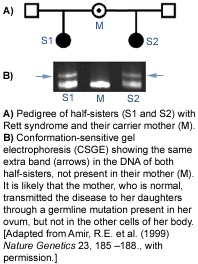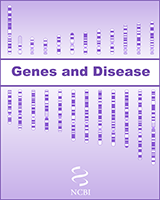NCBI Bookshelf. A service of the National Library of Medicine, National Institutes of Health.
National Center for Biotechnology Information (US). Genes and Disease [Internet]. Bethesda (MD): National Center for Biotechnology Information (US); 1998-.

Rett syndrome (RTT) is a progressive neurodevelopmental disorder almost exclusively affecting females. With an incidence of about 1 in 10,000 births, it is a common cause of profound mental impairment in girls. Typically, babies with RTT develop normally until the age of 6 to 18 months, when their developmental milestones regress. They lose purposeful use of their hands and are seriously disabled for life, with reduced muscle tone and seizures. A temporary "autistic-like" phase often occurs at the onset of the disorder, and older children are known for their social engagement through intense eye gaze.
RTT is caused by mutations in the gene MeCP2, found on the X chromosome. MeCP2 is called a "transcriptional repressor" because it codes for a protein that controls the expression of other genes. Depending on what part of the gene contains the mutation, partial loss of this protein changes the environment experienced by developmentally important proteins which, in turn, leads to the RTT phenotype.
MeCP2 mutations seem to be more common in the X chromosome from sperm cells, which may explain why RTT is rare in boys, who do not inherit an X chromosome from their father. Girls, however, inherit one copy of the X chromosome from each parent. Girls with RTT have one functional copy of MeCP2 to counteract the mutated MeCP2 copy. But, in a normal process called X inactivation, one X chromosome is randomly inactivated in every cell. This results in the normal copy of MeCP2 being inactivated in some cells but not in others. X-inactivation coupled with the specific MeCP2 mutation type causes the range of symptoms seen in RTT. By studying the relationships between the MeCP2 proteins and the proteins affected by it, investigators hope to develop treatments for Rett syndrome.
- Genome view see gene locations
- Entrez Gene collection of gene-related information
- BLink related sequences in different organisms
- Research articles online full text
- Books online books section
- OMIM catalog of human genes and disorders
- GeneReviews a medical genetics resource
- Information Sheet from the National Institute of Neurological Disorders and Stroke, NIH
- International Rett Syndrome Association support and information for families
- Rett syndrome - Genes and DiseaseRett syndrome - Genes and Disease
Your browsing activity is empty.
Activity recording is turned off.
See more...
